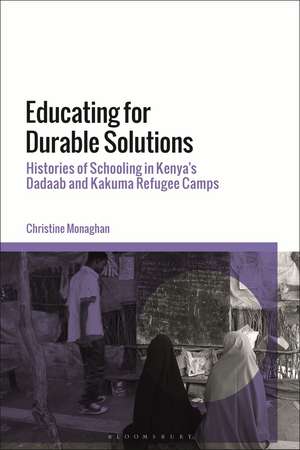Educating for Durable Solutions: Histories of Schooling in Kenya’s Dadaab and Kakuma Refugee Camps
Autor Christine Monaghanen Limba Engleză Paperback – 16 noi 2022
| Toate formatele și edițiile | Preț | Express |
|---|---|---|
| Paperback (1) | 196.54 lei 6-8 săpt. | |
| Bloomsbury Publishing – 16 noi 2022 | 196.54 lei 6-8 săpt. | |
| Hardback (1) | 495.13 lei 3-5 săpt. | +24.97 lei 5-11 zile |
| Bloomsbury Publishing – 5 mai 2021 | 495.13 lei 3-5 săpt. | +24.97 lei 5-11 zile |
Preț: 196.54 lei
Preț vechi: 257.21 lei
-24% Nou
Puncte Express: 295
Preț estimativ în valută:
37.61€ • 39.04$ • 31.36£
37.61€ • 39.04$ • 31.36£
Carte tipărită la comandă
Livrare economică 24 martie-07 aprilie
Preluare comenzi: 021 569.72.76
Specificații
ISBN-13: 9781350215245
ISBN-10: 1350215244
Pagini: 192
Dimensiuni: 156 x 234 mm
Greutate: 0.28 kg
Editura: Bloomsbury Publishing
Colecția Bloomsbury Academic
Locul publicării:London, United Kingdom
ISBN-10: 1350215244
Pagini: 192
Dimensiuni: 156 x 234 mm
Greutate: 0.28 kg
Editura: Bloomsbury Publishing
Colecția Bloomsbury Academic
Locul publicării:London, United Kingdom
Caracteristici
Offers new research into education policy and practice in two of the world's largest refugee camps in Kenya
Notă biografică
Christine Monaghan, PhD is a human rights researcher and advocate. Her teaching and research focus on the intersection between refugee education and globalization, and human rights education.
Cuprins
Foreword, Carol Anne Spreen (New York University, USA)Prologue1. For the State, But Not By the State2. Asking Why and How: A Historical Turn in Refugee Education Research3. From Emergency Education to Education in Emergencies (1992-2002)4. Education Guidelines, Standards, Priorities, and Strategies (2003-2012)5. Critical Junctures6. Driving Forward with the Rearview MirrorReferencesIndex
Recenzii
A crucial account for anyone making policy decisions in what is the most fluid and complex arena for education globally. In tracing critical junctures in refugee programming, this fascinating and revealing book outlines possibilities as well as warnings about what and who determines the educational fate of refugees.
This is an excellent contribution to the field of education in emergencies. Christine Monaghan brilliantly provides a critical analysis of the role of state and international agencies in shaping educational processes in the era of neoliberalism in which education in refugee settings is a state regulated, market-oriented and transnational activity.
Christine Monaghan delves into the important but insufficiently understood issue of refugee education and, in so doing, provides us with a well-written and insightful narrative that sheds light on the global-local tensions that affect the development, implementation, and impact of education policies in these contexts.
This book brings fascinating historical insights into how refugee education is shaped by states, international organizations, and refugees themselves. Drawing on oral histories from over 200 students, teachers, administrators, and program officers, Monaghan illuminates the decisions that have affected generations of refugee children and provides critical lessons for moving forward.
This is an excellent contribution to the field of education in emergencies. Christine Monaghan brilliantly provides a critical analysis of the role of state and international agencies in shaping educational processes in the era of neoliberalism in which education in refugee settings is a state regulated, market-oriented and transnational activity.
Christine Monaghan delves into the important but insufficiently understood issue of refugee education and, in so doing, provides us with a well-written and insightful narrative that sheds light on the global-local tensions that affect the development, implementation, and impact of education policies in these contexts.
This book brings fascinating historical insights into how refugee education is shaped by states, international organizations, and refugees themselves. Drawing on oral histories from over 200 students, teachers, administrators, and program officers, Monaghan illuminates the decisions that have affected generations of refugee children and provides critical lessons for moving forward.
